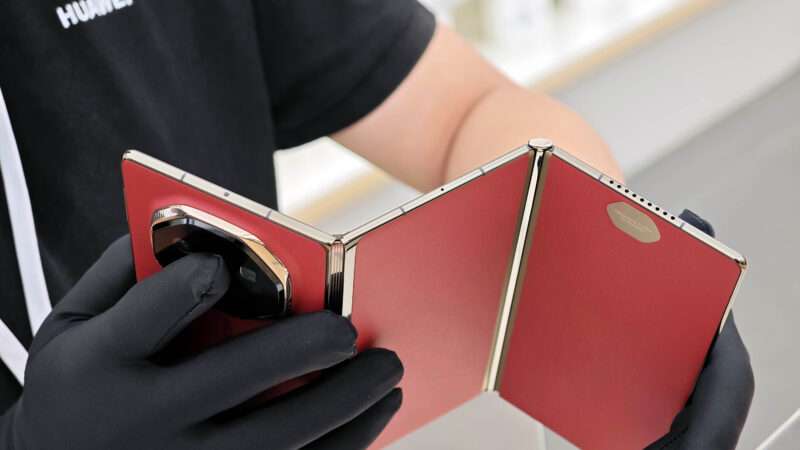
Two major announcements this week will shape the future of the smartphone industry, but most Americans have only heard of one of them.
The first is Apple's September Event, which on Monday introduced the iPhone 16 Pro, iPhone 16 Pro Max, and Apple Intelligence, the tech giant's latest attempt to make Siri useful. Today, Huawei, the largest domestic Chinese cellphone manufacturer, will unveil the first-ever trifold smartphone: the Mate XT.
As usual, Apple's announcement was a big hit. More than 8 million people watched the company's livestream on YouTube. Across the Pacific, the Mate XT has accumulated 3 million pre-orders before the product's official launch on September 10.
Huawei smartphones are nearly nonexistent in the American market, but they are common around the rest of the world. Huawei claims 19.85 percent of the Chinese market and 3.5 percent of the global market. Apple trounces Huawei, claiming over half of the American smartphone market (52 percent) and 16 percent of the global market. Both Apple's debut of its artificial intelligence and Huawei's never-before-seen trifold design are exciting developments, so why will there be very few American orders for the Mate XT? Federal policy is largely to blame. The Trump administration purged Huawei from American telecommunications systems and pressured allies to follow suit. This technonationalism has continued under the Biden administration, as documented by Reason's Eric Boehm in a 2021 article.
Opposition to Huawei was motivated by evidence of the company installing "back doors" in its telecom equipment, as well as concerns about its founder's ties to the Chinese Communist Party and the People's Liberation Army. In retaliation, the Trump administration granted the Department of Commerce the power to "determine that particular countries…are foreign adversaries." Following this order, the department added "Huawei and its 70 affiliates to the so-called 'Entity List,'" preventing firms from doing business with the Chinese company without federal approval.
In another instance of U.S.-Chinese decoupling, the Trump administration pressured Taiwan Semiconductor Manufacturing Company (TSMC) from selling chips to Huawei and bullied Britain into prohibiting its service providers from using Huawei tech. The final nail in Huawei's American coffin was a law "requiring that all cell phone carriers rip out Huawei tech and replace it," per Boehm.
Not only do American cellphone service providers not use Huawei equipment, but the three largest networks aren't even compatible with most Huawei devices. Verizon lists only two Huawei phones, the HERO 4 and H1511, both from 2015—obsolete by smartphone standards—as compatible with its network. AT&T also lists two: Ascent XT2 (2010) and the Ascend XT (2016). T-Mobile, on the other hand, doesn't list a single one. Given the paucity of Huawei service, it's no surprise that demand for the company's devices is virtually nonexistent. Cellphones and cell service are nearly perfect complements—one is of little use without the other. Since Americans effectively can't get the latter, the lack of demand for the former is unsurprising.
Yet the U.S. government has failed to cripple Huawei's manufacturing capabilities. The Chinese smartphone producer was the only major manufacturer to witness triple-digit growth this year, according to market researcher Counterpoint.
All that the Trump and Biden administrations have accomplished is prohibiting Americans from weighing costs and benefits and purchasing a usable Huawei device. If you're an American who would like to try out the Mate XT, you're out of luck.
The post The Feds Won't Let You Use These Cheap Chinese Cellphones appeared first on Reason.com.







